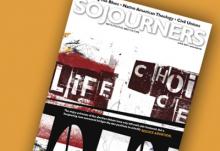Retooling seminaries for the world of today -- and tomorrow.
Feature

At age 29, Don McClanen founded the Fellowship of Christian Athletes. Five ministries later, McClanen -- now 83 -- continues his remarkable journey.

Seventeen activists and church leaders talk about the disciplines that keep them girded for the struggle.

How I learned the real meaning of strength -- from the unlikeliest of people.

SEVERAL HUNDRED PEOPLE stand on the grass waiting to enter the auditorium for the opening service of a Christian conference. People are holding bold, pre-printed signs (Teach for America, Evangelicals for Social Action, New York Theological Seminary) for the processional.
Meanwhile Richard Twiss has found a piece of scrap paper, because he doesn’t have a sign. He writes something with a ballpoint pen, then shows it to the four friends he’s standing with who are, like him, Native American evangelical theologians involved in ministry.
The others smile. The sign says: “Fighting Terrorism since 1492.”
It’s a cry for justice. It’s a serious reaction to the pain their communities continue to feel. It’s a reaction to all the other streams of “justice work” around them. It’s subversively funny. And it’s ballpoint pen on scrap paper, so it seems characteristic in another way: As they process in behind the sign over Twiss’ head, nobody in the auditorium can read what it says.
“It’s a problem of being heard,” says Randy Woodley, one of the theologians. “I feel like 500 years ago, maybe God did bring the white [people] over. But it was supposed to be something mutual, where we learned from each other. Instead the white [people] conquered, helped out by their understanding of Christianity. Five hundred years later, we ask ourselves, now are people ready to listen?”

How the out-of-control buying and selling of money led to our current crisis.

Chicago's Wilbur Wright College helps workers turn blue collars to green.

Auto idolatry and casino economics have left Detroit tottering on the brink. What will it take for Motown to rise again?

In Central America, Christians are countering gang and government violence armed only with faith and the belief that no one -- not even the worst criminal -- is beyond hope.

An interview with L'Arche founder Jean Vanier and theologian Stanley Hauerwas.

“This is my body, broken for you,” Jesus says to us in the central mystery of our faith. “Take and eat.” Eating is an inherently good activity, a channel of God’s goodness.
But in recent decades, this well has been poisoned for huge numbers of people. Anorexia, rare until the 1970s, today affects an estimated 1.5 million people in the United States. Perhaps twice that number have or are recovering from bulimia, a cycle of binge eating and purging (through vomiting or laxatives); millions more have binge eating alone. Up to one in five people with anorexia die from it—the highest death rate of any psychiatric illness. Eating disorders devastate the body, eroding teeth and bones, and stopping kidneys and hearts.
Christians certainly are not immune from eating disorders (they were “everywhere” at evangelical Wheaton College, one alum in recovery reports). But when was the last time you heard eating disorders mentioned in church? The body of Christ has a vocation to speak truth about the deadly idols of this present age, but instead we’ve kept a deafening silence.
Worse, underneath that silence are rubrics that reinforce rather than unravel the problems. You’re damned if you diet (vanity!) and damned if you don’t (gluttony!). Desire (for food or anything else) is blamed on the body, and both are lumped together as potential causes of sin. Old-fashioned sexism or newer libertarianism both give a pass to the hypersexualization and commodification of women.

Evangelist Charlotte Keys and the 'Jesus People' she organized took on a global corporation to save a small town.






